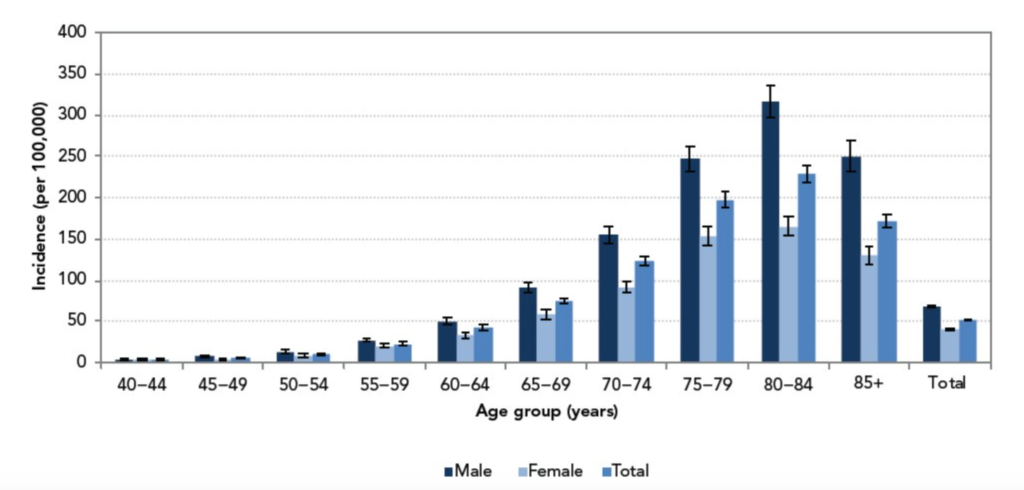Dopamine plays a part in the movement of one’s body. It assists with nerves sending signals to the brain. When Cells that produce Dopamine die, this can greatly affect the motor skills of that individual. This is the cause of Parkinson’s, also known as Parkinson’s disease.
In other words, Parkinson’s is a neurological disorder affecting the movement and physical abilities when there is a lack of dopamine-generating cells. This disorder is usually diagnosed to adults 40 and older, therefore not affecting youth and young adults.
About 100 000 people in Canada are currently living with Parkinson’s. The table below looks at the age and gender of diagnosed individuals in Canada. For more statistics, you can visit canada.ca.

What should you look out for?
Identifying Parkinson signs in the earliest stages can significantly help with the diagnosis, treatment and severity of this disorder. You can notice symptoms related to one’s motor abilities (ability to move), and their non-motor abilities. A complete list of symptoms is available on the Parkinson Canada website.
Motor Ability related symptoms
- Slowness of movement
- Rigidity
- Tremor
- Postural instability
Non-motor ability related symptoms
- Depression (At least 50% of people with Parkinson’s will go through some form of depression anxiety.)
- Drooling
- Choking and swallowing difficulties
- Insomnia
- Leg swelling
Contacting your Healthcare Provider
The first step to treating Parkinson’s is getting a diagnosis. This stage may involve a few tests and appointments before getting to a conclusion. Before you reach out to your healthcare practitioner, it is good to keep a record of your symptoms and its severity. After speaking to your healthcare practitioner, you may get directed to other professionals who can further support you. Some include:
- Neurologists – Likely a specialist in movement disorders. Can help with the diagnosis stage.
- Pharmacists – Can help with medication use and plans
- Physiotherapists – Helps with balance, posture, and mobility. Can also suggest possible exercises, techniques, and workouts.
- Speech Language Pathologist – Assists in speaking, eating, and swallowing difficulties
Unfortunately, there is no cure to Parkinson’s, though there are effective treatments and medications designed to make everyday activities easier for diagnosed individuals. Some possible plans include:
- Medications
- Surgeries
- Therapies (Occupational, Speech, and physical)
We hope you enjoyed our latest Health Hint!
Written by Shiyami Selvapavan
Useful resources
This process may be confusing or feel isolated. Fortunately, there are resources and helplines to help affected individuals.
Federated Health is a proud supporter of Parkinson Canada. On this page, you can learn more about Parkinson’s disease and how you can contribute and connect with this community. You can attend events, volunteer, and learn more about the impact on families today.
https://www.parkinson.ca/resources/support-groups/
This resource offered by Parkinson Canada can help you find a support group where you can talk to and connect with others affected by this disorder.
https://psso.ca/programs-services/support-and-exercise-groups/
If you live in the South-Western parts of Ontario, you can visit this resource to connect with others in this region. This site offers counselling, webinars, and events as well.
References
https://www.canada.ca/en/public-health/services/publications/diseases-conditions/parkinsonism.html







